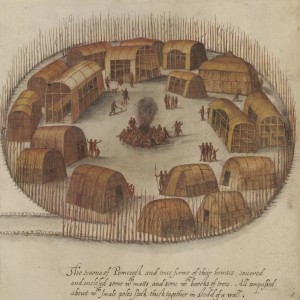The Missing American Colony
 Let me take you back to the late 16th century. Colonization of the New World is in full swing, with the British efforts being led by Sir Walter Raleigh, who had been appointed by Queen Elizabeth I specifically for this job. A lot of the mainland was settled by Native Americans (but not for long, don’t you worry – the rest of the settlers would make that problem go away soon enough), so Raleigh decided to settle on the island of Roanoke, just off the coast of modern day North Carolina. The colony proved to be an immense success, with the colonists turning out to be self-sufficient enough to manage it and live off the land. In 1587, a little girl named Virginia Dare would become the very first child to ever be born in the American Colonies, fated to live out the rest of her days on the island, working the fields and having the simple life of a 16th century colonist, just like her parents.
Let me take you back to the late 16th century. Colonization of the New World is in full swing, with the British efforts being led by Sir Walter Raleigh, who had been appointed by Queen Elizabeth I specifically for this job. A lot of the mainland was settled by Native Americans (but not for long, don’t you worry – the rest of the settlers would make that problem go away soon enough), so Raleigh decided to settle on the island of Roanoke, just off the coast of modern day North Carolina. The colony proved to be an immense success, with the colonists turning out to be self-sufficient enough to manage it and live off the land. In 1587, a little girl named Virginia Dare would become the very first child to ever be born in the American Colonies, fated to live out the rest of her days on the island, working the fields and having the simple life of a 16th century colonist, just like her parents.
Except that’s not what fate had in store for her. Shortly after the girl’s birth, her grandfather John White, appointed by Sir Raleigh as the governor of Virginia, left with a small crew back to England in order to gain more supplies for Roanoke. His journey ended up taking three years (which really makes those seven-hour long oceanic flights feel like a breeze), and in 1590, White finally returned to the colony… Only to find it completely deserted. Not a single person was there. Nothing of value was left. His family, including his little granddaughter, was gone without a trace. The only clue left was the word “Croatoan”, which had been carved into one of the trees – presumably by a fleeing colonist. There were no signs of violence, no puddles of blood, no bullet holes or tomahawks in the trees. The colony had been untouched, safe for the missing colonists and their belongings.
So the obvious question is what happened to Virginia Dare, her family and her fellow colonists? Why did they leave their home, and if they did, where did they go? Now, as you should know by now, I’m a man of reason and I don’t like to entertain impossibilities, so for the time being, let’s eliminate aliens, demons, Native American graveyards and anything else in this realm, okay? There are several theories that are a bit more grounded in nature, based on the evidence at hand. The likeliest explanation is that the colony found itself no longer able to sustain itself. It took three years to bring home the much-needed supplies, and it’s entirely possible that the colonists simply didn’t last that long. They may have left the island in search for a home with more resources, and on their way might have drowned, or been killed by Spanish conquistadors. The Dare Stones – a series of inscribed stones discovered in the 1930s – were apparently used as a gravestones for Virginia Dare, her father and most of the colonists, claiming that they were murdered by savages. However, it’s very likely that the stones were faked, given the fact that they were discovered quite far from Roanoke.
The likeliest theory received some support only recently, when two different teams discovered the remains of pottery in North Carolina. What’s interesting about this discovery is that it was made in a style called Border Ware, shared by a lot of the pottery and cutlery found in Roanoke. Which means that it’s very likely the colonists did, in fact, go inland, and eventually mixed in with some of the local native tribes. It seems like a stretch, but considering the fact that no bodies were ever discovered by future colonists, it seems unlikely that the inhabitants of Roanoke met their doom prematurely. The hint left on the tree – “Croatoan” – also supports this, as the Croatoan tribe lived on an island not far from Roanoke. It’s very likely that, rather than face starvation, the colonists (at least part of them) went there and mixed in with the local population. Unfortunately, at this point more concrete proof than that will likely be impossible to find. No matter what happened, though, it’s clear that the Roanoke Colony, alongside its youngest resident Virginia Dare, has been able to capture the minds and imaginations of people who lived hundreds of years after them – something that likely wouldn’t have happened had they remained untouched.